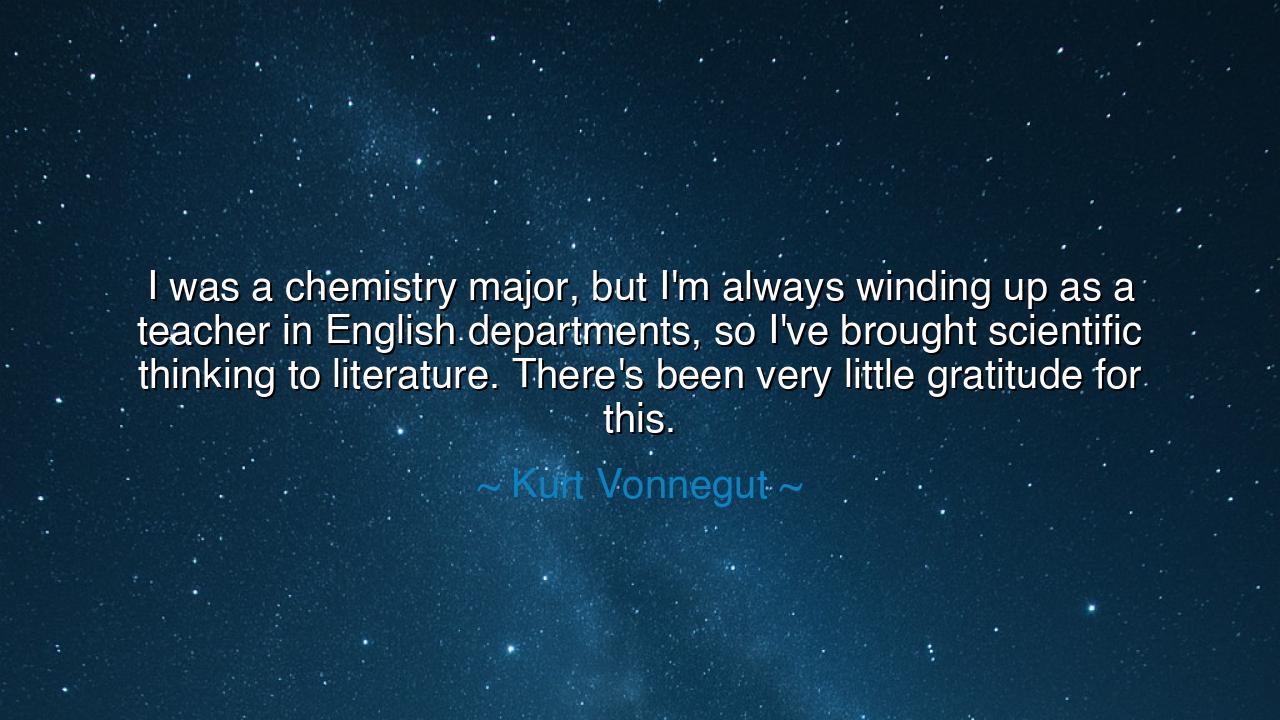
I was a chemistry major, but I'm always winding up as a teacher
I was a chemistry major, but I'm always winding up as a teacher in English departments, so I've brought scientific thinking to literature. There's been very little gratitude for this.






Kurt Vonnegut, the satirist whose words cut through illusion like a blade, once reflected with bitter humor: “I was a chemistry major, but I’m always winding up as a teacher in English departments, so I’ve brought scientific thinking to literature. There’s been very little gratitude for this.” In these lines, he captures not only the irony of his own career but also the eternal tension between two great ways of knowing — the analytical mind of science and the imaginative soul of art. He speaks as one caught between worlds, bringing the discipline of the laboratory into the realm of story, only to find himself met not with welcome, but with suspicion and coldness.
The ancients, too, wrestled with this divide. Plato sought to reconcile reason and myth, science and poetry, logic and allegory. Aristotle studied both the laws of the heavens and the tragedies of the stage, insisting that truth could be found in both numbers and narrative. Yet even in their time, there were those who looked upon the poet with distrust, and others who looked upon the philosopher as sterile and lifeless. Vonnegut’s words echo this age-old division: the scientist who ventures into literature may be seen as an intruder, and the writer who borrows the clarity of science may be thought cold.
Yet Vonnegut’s work itself proves the power of such union. His novels, filled with absurdity and irony, are at the same time marked by a scientific clarity — clean lines, logical structures, ruthless cause and effect. He took the precision of the chemist and wedded it to the imagination of the novelist, producing works that diagnose the sickness of society with both scalpel and satire. In Cat’s Cradle, for example, he made of a scientific invention, “ice-nine,” a parable of mankind’s hubris. Science became story; story became warning. And though he says there was “little gratitude,” history remembers him precisely because he fused these worlds.
We can recall, too, the life of Galileo. He was not a novelist, but he too brought scientific thinking into a realm long ruled by tradition — the heavens themselves. For daring to describe the stars mathematically, he was condemned, met with scorn rather than thanks. Yet in time, his union of observation and imagination changed the world. Vonnegut’s complaint, though half in jest, carries the same truth: innovators are often met with resistance, for they disturb the old boundaries, forcing others to question what has long been held apart.
The deeper meaning of Vonnegut’s words lies here: to bring one way of thought into another is to risk rejection, but it is also the only way to grow. The poet who thinks scientifically, the scientist who dreams poetically — these are the ones who expand the limits of human understanding. Gratitude may not come swiftly, for men often cling to divisions. But history, in its longer vision, honors those who dared to merge.
The lesson for us is to embrace the blending of disciplines, to refuse the false walls that separate art from science, reason from imagination. A story can be precise; a formula can be beautiful. To live wisely is to weave the strands together, bringing rigor to creativity and wonder to reason. Do not fear if others resist, for gratitude is often slow to appear. What matters is the truth that emerges when boundaries are crossed.
Practically, this means cultivating both sides of the mind. Read poetry as well as equations. Approach your craft, whatever it may be, with both creativity and discipline. If you are an artist, let clarity guide you; if you are a scientist, let imagination accompany you. For in the union lies strength, and in the crossing of paths lies innovation.
Thus, Vonnegut’s words, half lament, half jest, endure as wisdom: “I was a chemistry major, but I’m always winding up as a teacher in English departments… There’s been very little gratitude.” Hear them not as bitterness, but as a reminder: those who bring light from one realm into another are often unthanked in their own day. Yet they are the ones who prepare the road for generations to come.






AAdministratorAdministrator
Welcome, honored guests. Please leave a comment, we will respond soon